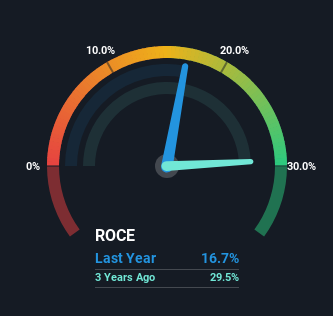- China
- /
- Consumer Durables
- /
- SHSE:603219
Here's What's Concerning About Ningbo Fujia Industrial's (SHSE:603219) Returns On Capital

If you're not sure where to start when looking for the next multi-bagger, there are a few key trends you should keep an eye out for. Firstly, we'll want to see a proven return on capital employed (ROCE) that is increasing, and secondly, an expanding base of capital employed. If you see this, it typically means it's a company with a great business model and plenty of profitable reinvestment opportunities. However, after investigating Ningbo Fujia Industrial (SHSE:603219), we don't think it's current trends fit the mold of a multi-bagger.
Understanding Return On Capital Employed (ROCE)
Just to clarify if you're unsure, ROCE is a metric for evaluating how much pre-tax income (in percentage terms) a company earns on the capital invested in its business. To calculate this metric for Ningbo Fujia Industrial, this is the formula:
Return on Capital Employed = Earnings Before Interest and Tax (EBIT) ÷ (Total Assets - Current Liabilities)
0.17 = CN¥281m ÷ (CN¥2.6b - CN¥922m) (Based on the trailing twelve months to March 2024).
Therefore, Ningbo Fujia Industrial has an ROCE of 17%. On its own, that's a standard return, however it's much better than the 8.4% generated by the Consumer Durables industry.
See our latest analysis for Ningbo Fujia Industrial

Above you can see how the current ROCE for Ningbo Fujia Industrial compares to its prior returns on capital, but there's only so much you can tell from the past. If you'd like, you can check out the forecasts from the analysts covering Ningbo Fujia Industrial for free.
What The Trend Of ROCE Can Tell Us
On the surface, the trend of ROCE at Ningbo Fujia Industrial doesn't inspire confidence. Around five years ago the returns on capital were 23%, but since then they've fallen to 17%. Meanwhile, the business is utilizing more capital but this hasn't moved the needle much in terms of sales in the past 12 months, so this could reflect longer term investments. It's worth keeping an eye on the company's earnings from here on to see if these investments do end up contributing to the bottom line.
On a side note, Ningbo Fujia Industrial has done well to pay down its current liabilities to 35% of total assets. So we could link some of this to the decrease in ROCE. What's more, this can reduce some aspects of risk to the business because now the company's suppliers or short-term creditors are funding less of its operations. Some would claim this reduces the business' efficiency at generating ROCE since it is now funding more of the operations with its own money.
Our Take On Ningbo Fujia Industrial's ROCE
Bringing it all together, while we're somewhat encouraged by Ningbo Fujia Industrial's reinvestment in its own business, we're aware that returns are shrinking. Although the market must be expecting these trends to improve because the stock has gained 9.5% over the last year. But if the trajectory of these underlying trends continue, we think the likelihood of it being a multi-bagger from here isn't high.
Ningbo Fujia Industrial does have some risks though, and we've spotted 1 warning sign for Ningbo Fujia Industrial that you might be interested in.
While Ningbo Fujia Industrial may not currently earn the highest returns, we've compiled a list of companies that currently earn more than 25% return on equity. Check out this free list here.
Valuation is complex, but we're here to simplify it.
Discover if Ningbo Fujia Industrial might be undervalued or overvalued with our detailed analysis, featuring fair value estimates, potential risks, dividends, insider trades, and its financial condition.
Access Free AnalysisHave feedback on this article? Concerned about the content? Get in touch with us directly. Alternatively, email editorial-team (at) simplywallst.com.
This article by Simply Wall St is general in nature. We provide commentary based on historical data and analyst forecasts only using an unbiased methodology and our articles are not intended to be financial advice. It does not constitute a recommendation to buy or sell any stock, and does not take account of your objectives, or your financial situation. We aim to bring you long-term focused analysis driven by fundamental data. Note that our analysis may not factor in the latest price-sensitive company announcements or qualitative material. Simply Wall St has no position in any stocks mentioned.
About SHSE:603219
Ningbo Fujia Industrial
Manufactures and sells vacuum cleaners, motors, and vacuum cleaner spare parts in China.
Flawless balance sheet low.
Market Insights
Community Narratives



